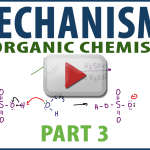Organic chemistry is all about mechanisms. And while the sheer volume may feel overwhelming, they all boil down to a few simple types of mechanism steps. In Part 1 and Part 2 we looked at the four common mechanism types: Nucleophilic attack, Loss of Leaving Group, Proton transfer and Rearrangements. In this video we’ll look at TWO […]
Proton Transfer and Rearrangement Mechanisms in Organic Chemistry
Proton transfer and rearrangements are 2 more common mechanism patterns you will face in organic chemistry. This is in addition to Nucleophilic attack and Loss of Leaving Group discussed in Mechanism Video Part 1. You’ll see multiple proton transfer examples in action including turning a bad leaving group into a good leaving group! Rearrangement mechanism are broken down for […]
SN2 Reaction vid Bimolecular Nucleophilic Substitution Part 3
SN1 SN2 E1 Series: Video 14 Bimolecular substitution is a fast reaction which requires a good leaving group. Or at least one that can be kicked out easily. However, when faced with a bad leaving group, you must first ‘bribe’ the atom turning into a more willing leaving group before proceeding with the reaction. This […]
Oxygen As A Leaving Group Using Tosylate And Mesylate in Substitution and Elimination Reactions
SN1 SN2 E1 Series: Video 8 Oxygen makes a poor leaving group in substitution and elimination reactions. That is, when left in its initial form. The key to kicking out an oxygen is to ‘bribe it’ by turning it into a better leaving group. Watch this video for a detailed explanation with examples using tosylate, […]
Leaving Groups in Substitution and Elimination Reactions Part 1
SN1 SN2 E1 Series: Video 7 When determining between substitution and elimination reactions, the final step in the 4-part checklist involves the leaving group. Can it leave? Will it leave? (Watch on YouTube: Leaving Groups 1. Click CC on bottom right for transcript.) <– Watch Previous Video: Polar Protic, Aprotic, and Non-Polar Solvents in Substitution and […]







